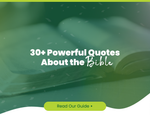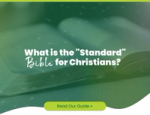In the Days of Rain - Review
Aaron Lewendon - Eden Bibles & Bible Study Specialist

“For now we see through a glass, darkly; but then face to face: now I know in part; but then shall I know even as also I am known” - 1 Corinthians 13:12
In his final weeks Rebecca Stott’s father, weakened and raging against his own ‘dying of the light’, passed down as much of his story as possible before passing away. Together with her own daughter, Rebecca Stott sifted through mounds of old notes, newspaper clippings, and the recorded voice of her departed father to reconstruct the history of a family living under the stern gaze of the Exclusive Brethren.
An extreme subset of the Evangelical movement, the Exclusive Brethren withdrew themselves from the Open Brethren in 1848. Before reading In the Days of Rain I knew very little about them. I had a vague picture of stark religious conservatism, dressed in all greys and beiges, the women with their hair covered and the men upright in sobre suits, quietly filing into their unadorned meeting rooms. While this bland image was not entirely incorrect, I had no idea of the truth that gathered behind the doors of those meeting rooms and homes of the Exclusive Brethren. The accounts of the Brethren in Rebecca Stott’s book are certainly horrific. Yey, they are not what makes In the Days of Rain so very compelling. This is not an exposé of a religious cult - though there is certainly enough to horrify - but a family history. It looks along the branches of the Stott family tree, and the effect the Exclusive Brethren upon them, especially that of her father.
Divided in four sections, entitled Reckoning, Before, During, and Aftermath, In the Days of Rain is an autobiography of great consequence, and great pain. Suitably apocalyptic, each part weaves between past and present - between the events themselves and the pain of unearthing them. Separation itself is rife throughout In the Days of Rain. Not only in the before/after approach which builds to a truly horrific realization, but also in the nature of the Exclusive Brethren themselves, whose defining act is one of separation from the outside world. Even for minor infractions, a Brethren member can be completely ostracised. Not only cut out from the Brethren community, but from their family and friends; the only people they may have ever known.
.jpg)
What can make this a hard book for Christian readers is seeing the distorted shades of their own faith reflected back at them. For anyone brought up in Church from a young age, In the Days of Rain is like looking into warped mirror of a fun-house. It’s as likely to provoke fascination as it is repulsion at the familiarity of the monster staring back at you. These are people forced into seeing through a darker glass then most, and who grow up knowing increasingly less and less of themselves - all of which became a doorway for manipulation from higher up figures within the Brethren. But reading it as a Christian challenges you keep your faith in check, to recognise when human impulses and desires attempt to steer individuals and Churches away from what is right.
Something which struck me was that Rebecca Stott, in digging up grave offences committed by her father and the Brethren - offences which tore her family apart and scarred her emotionally - she never attacked or interjected with pain-filled barbs against her father’s deeds. Throughout it all she keeps the measured composure of a historian who knows that there is no such thing as a complete picture, and so never rushes in to judge. The events and actions of the Brethren speak for themselves. It is her father that Stott seeks to understand, and in doing so rises above the easy road of bitterness or revenge. In the Days of Rain is coloured by a compassion that knows no bounds, that seeks understanding and forgiveness for her father above all. A man staggering out from beneath the shadow of a cult, Rebecca Stott’s father looms over the book as a portrait of someone broken by bad faith, and whose desperate grasping at a life beyond the Brethren strikes a chord for anyone lost in a search for ultimate meaning.
In the Days of Rain is not, ultimately, a Christian book. It is sympathetic to the beliefs of others, even those found behind the doors of the still-active Exclusive (now Plymouth) Brethren, but it is not a book which ends with the typical final-chapter turning to Christianity. Rather, its value lies in Rebecca Stott herself, and her ability to tread back through a horrific past and still come out it with a generosity of heart, and a compassion for those whose lives were similarly broken.
Latest Blogs

Gifts
Finding Your Symbol of Faith: A Guide to Christian Cross Necklaces
Looking for the perfect symbol of faith? Explore our guide to Christian cross necklaces, from rustic wooden designs and sturdy men's chains to elegant silver pendants.

Gifts
The Best Christian Gifts for Under £20
Looking for a meaningful gift that won't break the bank? Explore our guide to the best Christian gifts under £20, from inspiring journals to beautiful home decor.

Gift Guide
15 Confirmation Gift Ideas for Boys and Girls
Celebrating a confirmation? Discover 15 meaningful gift ideas for boys and girls, from youth Bibles and jewellery to inspiring journals and keepsakes.

Bible
30+ Powerful Quotes About the Bible (For Inspiration in 2026)
Looking for inspiration? Discover a curated collection of the most powerful quotes about the Bible, from famous historical figures to modern theologians and Scripture itself.

Bibles
What is the "Standard" Bible for Christians?
Is there an "official" Bible that all Christians use? We explain the difference between the NIV, KJV, and ESV, and help you find the standard text for your church or personal reading.

Bible
"I Keep Failing to Read the Bible" – 5 Tips to Make the Habit Stick
Do you start a Bible reading plan only to quit a few weeks later? Stop the cycle of guilt. Here are 5 psychological tips and practical changes to help you build a Bible habit that actually lasts in 2026.
